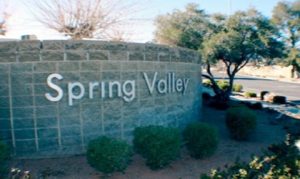After in July announcing a plan to bring a new casino development to a 71-acre parcel of desert land in the southwest valley about 2 miles west of the Las Vegas Strip that it has owned since 2000, local casino operator Station Casinos received some good news on Tuesday night.
According to a source, the Spring Valley Town Advisory Board voted in favor of the operator’s plans for the yet to be named casino resort, which reportedly includes just under 100,000 square feet of gaming space with 2,000 slot machines and 40 tables games, a state-of-the-art sportsbook, a 400-plus room and suites hotel and 20,000 square feet of outdoor dining space.
Revenue incentive:
After the board’s approval, the Las Vegas-based hotel and casino company released the following statement…
“Station Casinos appreciates the Spring Valley Town Advisory Board and its residents for their input on and support of the Durango project. Our new development will be a great addition and a great community partner, employing thousands of construction and full-time team members and creating tens of millions of dollars in new state and local taxes. The Company looks forward to releasing more information on the project in the weeks ahead.”
Traffic complaint:

While the five-member board gave the plans a green light, community members of the unincorporated town in Clark County were on hand during the meeting to voice their concerns with the project known as “Durango Station.” Apparently, the area that surrounds the property is residential and there are schools located near the proposed entrances. And some of the 50 or so town’s people that attended the meeting said they are worried about an increase in traffic and unless adjusted the casino shouldn’t go up.
“Nothing that comes from the culinary union can be trusted.”
Meanwhile, the Culinary Union, which reportedly has members who reside in the area, was also represented at Tuesday’s meeting. And according to CBS-affiliated television station KLAS-TV 8 News Now, they also oppose the plan due to concerns about traffic.
Station Casinos reportedly released the following statement in response to the Culinary Union‘s opposition…
“It is unfortunate, but we are not surprised, as we have grown used to decades of endless harassment by the culinary union. Instead of applauding a project that will pay millions in local taxes, create a beautiful new amenity for the neighborhood and create thousands of construction and permanent jobs, including jobs for people they supposedly care about, they take the low road and play petty politics. Nothing that comes from the culinary union can be trusted.”

Concerns to be addressed:
Still, plans for the project were approved by the board while also recommending that the developers review any improvements.
Rebecca Miltenberger, a real estate attorney representing Station Casinos via the Denver-based law firm of Brownstein Hyatt Farber Schreck, who explained the scale of the project to meeting attendees, said, “We will be working through any traffic concerns with staff.” The attorney also said the project presented “proposes a much less intense use.”
According to 8 News Now, a final decision will be made when Clark County commissioners meet next month, and that they will take public comment and Tuesday’s vote into consideration.
Back in July when Station Casinos executives shared details about their plans for the long-awaited Durango project, they said the goal is to break ground in the first quarter of 2022, with completion expected to take 18 to 24 months from then.
According to an earlier report, the position of Station Casinos Chief Executive Officer Frank Fertitta III and parent company, Red Rock Resorts, Inc., is that the area, which has little competition within five square miles and has a growing population, is ripe for a casino.
A July Las Vegas Review-Journal report cites a note from a J.P. Morgan gaming analyst that puts the total cost for the development around $400 million.
In the works for more than two decades, the operator had planned to open a casino with a 201-key hotel tower and meeting space in 2008, but those plans were scrubbed due to the Great Recession.



